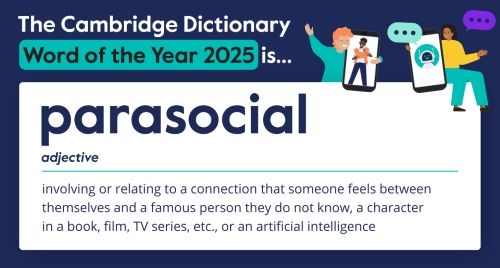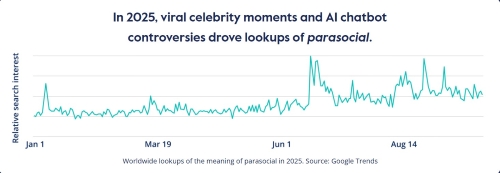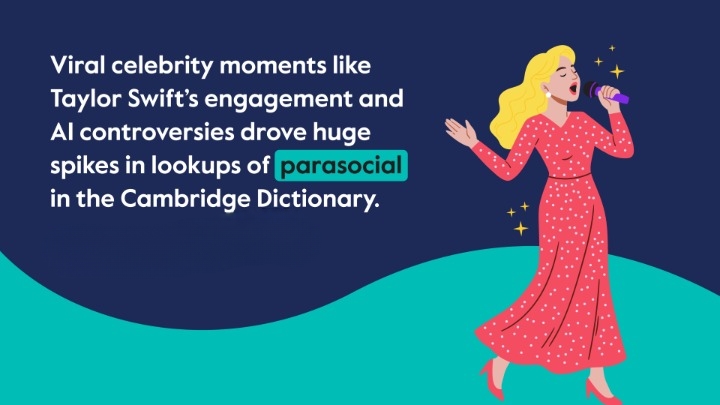Every year, dictionaries come to a verdict of a “Word of the Year” which is a single word that captures the spirit, concerns, or mood of that year. For 2025, the Cambridge Dictionary has selected a term that speaks deeply to how we relate to people we admire, follow, or even imagine: Parasocial. This choice reflects how modern relationships and not just with celebrities, but with AI and digital personalities are changing the way we feel connected.
What Is the Cambridge Dictionary’s Word of the Year 2025?
The Cambridge Dictionary’s Word of the Year for 2025 is “Parasocial.” This announcement was made by Cambridge University Press & Assessment, which is the institution behind the Cambridge Dictionary.
Colin McIntosh of the Cambridge Dictionary said: “Parasocial captures the 2025 zeitgeist. It's a great example of how language changes. What was once a specialist academic term has become mainstream. Millions of people are engaged in parasocial relationships; many more are simply intrigued by their rise. The data reflects that, with the Cambridge Dictionary website seeing spikes in lookups for ‘parasocial’. The language around parasocial phenomena is evolving fast, as technology, society and culture shift and mutate: from celebrities to chatbots, parasocial trends are fascinating for those who are interested in the development of language.”
READ| What Is The 2025 Word Of The Year? Dictionary.com Unveils The Word Of The Year Is…
What Is the Meaning of “Parasocial”?
According to the Cambridge Dictionary, Parasocial means “involving or relating to a connection that someone feels between themselves and a famous person they do not know, a character in a book, film, TV series, etc., or an artificial intelligence”

Source: Cambridge
When we talk about it simply, this word means you might feel very close to a celebrity, a fictional character, or even a chatbot, but that “relationship” isn’t mutual.
Why Was This Word Chosen for 2025?
There are several reasons why parasocial perfectly captures the mood and changes of 2025:
Spike in Usage

Cambridge lexicographers noticed a huge rise in searches for the word “parasocial” on their website over the years.
This means more and more people are curious about what the word means because they’re experiencing or observing parasocial connections in real life.
From Academic to Everyday

Source: Cambridge
The word "Parasocial” was first coined in 1956 by sociologists Donald Horton and Richard Wohl when they observed television viewers engaged in para-social relationships with on-screen personalities.
The Cambridge website mentions: “The term dates back to 1956, when University of Chicago sociologists Donald Horton and Richard Wohl observed television viewers engaged in ‘para-social’ relationships with on-screen personalities, resembling those they formed with ‘real’ family and friends. They noted how the rapidly expanding medium of television brought the faces of actors directly into viewers’ homes, making them fixtures in people’s lives.”
This word was earlier used in academic terms. But in 2025, it shifted into the mainstream. People now use it on social media, in news stories, and in regular conversation to describe their real feelings toward public figures, influencers, and even AI.
Relevance to Modern Fandom
The world of fandoms, especially online, is changing fast. According to Cambridge, Fans don’t just follow celebrities anymore; they feel like they know them. imone Schnall, Professor of Experimental Social Psychology at the University of Cambridge, mentions: “As trust in mainstream and traditional media breaks down, people turn to individual personalities as authorities, and - when they spend many hours consuming their content - develop parasocial bonds, treating them more like close friends, family or cult leaders. When an influencer has so many followers, people assume they are trustworthy. This leads to a sense that people ‘know’ those they form parasocial bonds with, can trust them and even to extreme forms of loyalty. Yet it’s completely one sided.”
Even AI chatbots are playing a role: many people form emotional bonds with AI tools like ChatGPT, treating them as confidants, friends, or something more.
Some Examples

Events in 2025 highlighted the concept in a very public way. For instance, the intense fan reaction to Taylor Swift and Travis Kelce’s engagement showed how emotionally invested they are in celebrities.
Also, conversations around “parasocial grief”, especially when public personalities or fictional characters end their stories, brought the term into more widespread use.
In conclusion, the selection of this word as the Cambridge Dictionary Word of the Year 2025 is more than just a linguistic choice, as it serves as a mirror to our times. In a world where social media, fandom and AI are taking over and establishing the new normal, this word resonates deeply. It forces us to reflect on how we connect, who we feel close to, and whether those connections are mutual or entirely one-sided.
Comments
All Comments (0)
Join the conversation